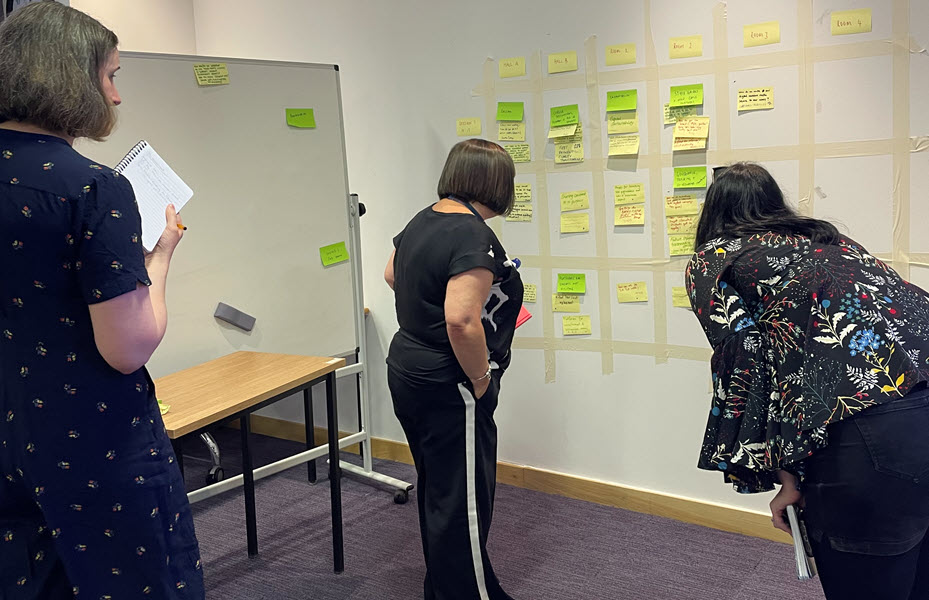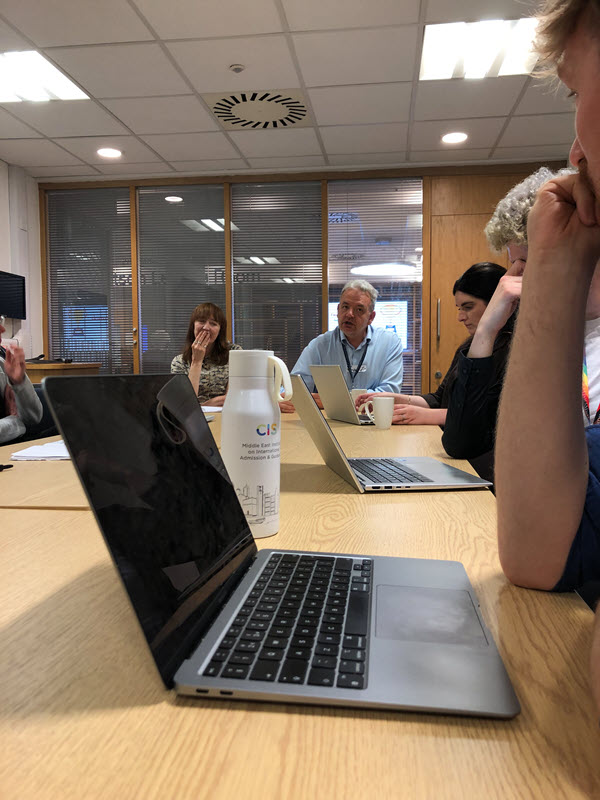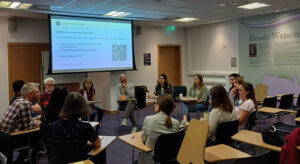Reflections on our pilot digital student recruitment unconference
We hosted our first internal unconference last week, attended by about 50 colleagues. The experience was overwhelmingly positive with great feedback and lots of thought-provoking discussion.
About the unconference
We gave the event an overall theme of how we can work together to make prospective student digital experiences the best they can be. It ran over a half-day, offering 3 sessions each with 5 tracks.
The location was the University’s Outreach Centre, a perfect venue for this kind of event, given there’s a large hall connected to a suite of breakout rooms by a social space.
Our promotional blog post for the unconference
Delegate feedback
We had a fantastic response rate, with over 50% of delegates taking the time to tell us what they thought of the event. The reception to the event was excellent too.
96% of respondents were positive about the overall experience, agreeing or agreeing strongly that the unconference was well organised and had been worthwhile attending.
We asked if delegates had a favourite session. A few dominated responses about the 15 that had taken place:
- TikTok – How can we do TikTok well?
- Careers and alumni content – Using careers, alumni, fees and funding information better to support postgraduate recruitment
- Student recruitment and admissions governance – how to engage; supporting future corporate level campaigns and tracking prospective student journey
- AI experiments and experiences: how are people using AI for content editing/creation? How would you like to use it for improving prospective student experience?
- Brand/style guides and content structure – how you use current guidance; what content structure elements do you want to see in EdWeb 2?
Session schedule – digital student recruitment unconference 2025 (Excel spreadsheet download)

The programme was rapidly assembled from delegates proposals. Delegates could make their choices from the rough-and-ready wall listing or from the spreadsheet we made available shortly after.
“MANY thanks again … for a most EXCELLENT morning. Properly enjoyed it and feel energised and enthused. What an awesome bunch of folks.”
Marie Storrar, School of Social and Political Science
We asked how we could improve things for next time and the majority of responses here related to:
- Running the unconference over a full day so that we could have a slightly later and more relaxed start, slightly longer breaks between sessions, and of course more sessions.
- Assigning a note-taker to each session so that actions could be captured, and summaries of sessions shared.
- Assigning a facilitator to each session to try to ensure that the conversation stayed on topic and wasn’t dominated by any particular voices.
We also asked what we definitely should not change. This was most delegates first experience of an unconference, and the vast majority of respondents spoke positively about the format and the relatively small size which encouraged greater democracy, a relaxed atmosphere and people generally feeling more comfortable with getting directly involved.
“… massive thanks … for the unconference today. I really enjoyed it and got a lot of feedback and ideas for various projects/initiatives I am involved in. It was a great (more relaxed way) to get perspectives from my stakeholders. Thanks for showing us all the value of this format.”
Heather Macbain, Head of Marketing

Self organising groups held a range of discussions on digital student recruitment-related topics.
Team reflections
I asked the Prospective Student Web Team for some quick impressions of the day too.
Something good
- Neil: After some initial nerves or uncertainty among the delegates, I loved how quickly people took to the format and the energy it created.
- Pete: It’s a great way to get meet colleagues you might not otherwise meet and learn about the successes and challenges in their area.
- Lauren: My only other unconference experience was with colleagues across UK unis. I appreciated this being an internal event because it felt more practical getting to chat with colleagues working in the same context.
- Heike: It was great to meet colleagues in person I had previously only known from emails and Teams meetings. Speaking to them in a more relaxed atmosphere strengthens the network and improves future cooperation.
- Jen: I always get a lot out of the conversations between the sessions at events like these, and this was no different. I felt I had space and time to check in and catch up with what people are doing which can be hard to find in an ordinary work day.
- Nicole: It was great to see colleagues from right across the University taking part – especially those I’d only met online before this event. It’s encouraging to know so many of us share the same goals even when our day-to-day work is very different from each other.
- Flo: It was a great opportunity to put faces to names and speak with people who would normally be in an office on the other side of Edinburgh. I learned a lot both during the sessions and when chatting informally during breaks. It also just felt like an incredibly productive day – three full sessions knocked out by lunchtime!
- Cathy: Several delegates commented on how much they valued the democratic format of nominating and voting on topics for sessions, and how it allowed for colleagues to engage in useful conversations that were relevant to the majority. It was also a great opportunity to meet in-person for the first time with colleagues that I had previously only ever emailed or met in online meetings.
- Louis: It was great to meet colleagues from across the University. The sessions I attended included a diverse range of people (in terms of areas and roles) and this added a lot to the sessions by having different perspectives on topics.
Something we might change or improve
- Neil: We started early and squeezed a lot into the half day. Next time, I’d love us to take a whole day with a bit more space between the sessions.
- Pete: Would be good if we could take actions from the sessions and think about how we might follow up on them.
- Lauren: Now that more people are familiar with the format, next time, I would love to encourage attendees to run sessions where they share case studies or run mini workshops.
- Heike: It would be good to take notes during the sessions. This would allow us to create actions and to catch up on sessions we could not join.
- Jen: It felt a little fast-paced particularly when choosing which session to go next, so a little more time between sessions would have helped.
- Nicole: I found it hard to choose between some sessions, so it might have been nice to have some sort of feedback from each session to the whole group so we had an idea of what was discussed.
- Flo: I agree with what’s been said above: a full day conference would be great, as would some organised note-taking and perhaps a dedicated chunk of time at the end of each session where we discuss actions to carry forward. I’d also love to attend sessions with case studies or mini workshops, as Lauren suggests.
- Cathy: The format of nominating topics for sessions on the day makes it difficult to try to identify actions that can be taken away at the end of a session. Actions or takeaways would likely help delegates to follow up and take forward points from the conversations they have had throughout the day.
- Louis: With the number of interesting topics proposed, it was difficult to choose between sessions. Maybe next time it can be a full day.
Favourite session or take away from the event
- Neil: All the sessions were good, but I think I got the most out of listening to colleagues talk about their perceptions of the newly introduced student recruitment governance framework.
- Pete: I liked the sessions about AI; learning how other colleagues were using it and the challenges they were encountering.
- Lauren: I ran a session on cross-team collaboration, where I got some great insights from school- and college-based colleagues on how they work with one another. I especially appreciated hearing from an academic colleague on how they find the degree finder update process.
- Heike: I found the AI session I co-proposed very useful. Participants exchanged how they use AI tools, considered the limitations of the Edinburgh Language Model (ELM) and informed colleagues about ELM developments
- Jen: I enjoyed all the discussions I participated in, but particularly the careers and alumni information strand. It was interesting hearing more about the work of other teams as they try to access post-graduation careers information, and how they might improve their processes for engaging with alumni.
- Nicole: I enjoyed the session where we heard how people are experimenting with AI. We all face similar challenges with this, but it was inspiring to hear where people had found a use for it.
- Flo: I attended two AI sessions and found those useful as I’m currently doing research in this area. It was interesting to hear how colleagues are using AI and to begin brainstorming how we could make these tools safer and more effective for us in the work environment – ideas included creating a University bank of tried and tested prompts for meeting different content requirements.
- Cathy: At the first session I attended, colleagues discussed how we apply the style guide to content editing, the value of translating webpage content into other languages, and types of content that are not easily presented on EdWeb page with the elements currently available to editors. The ideas and approaches that colleagues shared has inspired me to explore some of my own ideas on these topics.
- Louis: I enjoyed listening to colleagues across the university talk about how they’ve trialled and implemented AI into their work. Naturally, there were mixed emotions about the technology and it’s clear that more governance and guidance are needed for staff across the University.

We used the main lecture hall space to accommodate the most popular sessions, as the breakout rooms could host a maximum of 16 delegates.
Concluding thoughts
The event went really smoothly, and with relatively little overhead for the Team to make it happen.
The overwhelmingly enthusiastic response from colleagues has been lovely, including direct emails and comments I’ve had on top of the formal feedback.
So all-in-all this was exactly as I’d hoped, and we’ve piloted something we can learn and grow from. We couldn’t have done this though, without the pioneering work of others like GovCamp and EduCamp, who lead the way and involved us, and the individuals who generously gave me advice on running our own unconference.
I would like to do this again for the Edinburgh student recruitment community; but do it bigger and for longer. I also think there is loads of potential for cross-sector events which hopefully will become more feasible as universities emerge from the current straightened times. Both Jen and I are keen to bring together colleagues who manage online degree listings as we think it’s a rich area to explore with challenges common to all universities.
I have mixed feelings about some of the feedback we had for improvements.
Facilitators in sessions, absolutely. Or at least providing mechanisms like Lean Coffee to support the agenda. Nobody wants to feel stuck in a “conversation” with domineering voices.
But as for note-takers and actions in sessions, I’m not so sure. If people want to self-organise and want to take a session this way, the opportunity is there. I suppose this being an internal event, in some sessions it may have felt more like a meeting.
When I think of other conferences I’ve attended, there’s not usually an obligation on any party to formalise what happened in a particular breakout session. Sometimes you get the speaker’s slides and some attendees choose to write up their notes and share, but there’s no particular expectation. I don’t know if notes, actions and feedback to the wider group would impact the wider feel of an unconference especially when so many spoke so positively about the relaxed and organic nature of the day.
Nonetheless, we’ll take all this on, discuss with colleagues how and when we might repeat and I look forward to going again, with something bigger, better and more inclusive.
More unconference experiences
This isn’t the first unconference we’ve been involved in.



